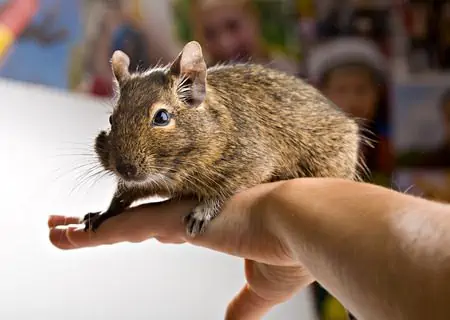Fascinating facts about the degu The degu is a small caviomorph rodent endemic to Chile It belongs to the same group of animals (infraorder Hystricognathi) as the guinea pig and chinchilla They have open rooted, continually growing cheek teeth They’re strictly herbivorous and feed on a wide variety of plants, roots and seeds in the wild They are very social

21st April 2017
Fascinating facts about the degu
- The degu is a small caviomorph rodent endemic to Chile
- It belongs to the same group of animals (infraorder Hystricognathi) as the guinea pig and chinchilla
- They have open rooted, continually growing cheek teeth
- They’re strictly herbivorous and feed on a wide variety of plants, roots and seeds in the wild
- They are very social mammals - if they are not given social interaction and physical stimuli, they can become aggressive towards each other or self-mutilate
- They perform coprophagy to extract more nutrition from their diet
- Although degus are closely related to guinea pigs, research has shown they are able to synthesise their own vitamin C, so no supplementation requirement
- They don’t hibernate
- They’re diurnal
What do they eat?
A good captive degu diet consists of a mixture of high fibre low sugar pellets together with good quality feeding hay (meadow or timothy hay). At Burgess Pet Care we have a wide range of high quality fibre rich foods specifically processed and packed for pet fibrevores.
See our range of fibrevore foods
7 common conditions seen in the degu
- Dental disease - like all other rodents, degu’s have teeth that continually grow. The incisors are generally straight and orange in colour. This is normal. Overgrown teeth can cause infection, pain, drooling of saliva and a reduced appetite. Retrospective studies have shown that as many as 60% of pet degus have acquired dental disease.
- Alopecia – hair loss as a result of self inflicted trauma. Chewing and barbering are relatively common – often triggered by anxiety, stress and boredom.
- Diabetes – It is important to know degus are very intolerant to sugars. They have been found to have a divergent insulin structure and are highly susceptible to developing diabetes mellitus when fed regularly on a diet containing free sugars. Foods containing sugar (such as fruits, raisins and muesli cereals) should be avoided. Diabetes shouldn’t be ignored. Overfeeding of carbohydrate and sugar will overload the animal’s normal digestive system, and will potentially lead to diabetes. The key signs of diabetes are very similar to those in other mammals, and include; Drinking more, weight loss and cataracts
- Cataracts – changes to the lens often occur as a consequence of diabetes. Cataracts can also be age related or inherited.
- Obesity - Overfeeding will result in weight gain and ultimately obesity. Always weigh the animal accurately and work out its energy requirements to prevent this problem.
- Respiratory problems - Degu’s are susceptible to respiratory disease for several reasons. Common causes include wet, dirty or dusty bedding, so make sure you stress the importance of good husbandry and hygiene. Check for abnormal signs such as unusual clicking noises, discharges from the nose and eyes, and fast, irregular breathing. Mycoplasma spp. can affect the respiratory tract, nasal cavities and middle ear. Many other pathogens can also be involved, including Pasteurella spp., Bordetella bronchiseptica and Streptococcus spp.
- Pododermatitis - infected and swollen pads. This condition is usually caused by degus walking on wire mesh or rough, abrasive floors over long periods of time. It can be aggravated by poor cage hygiene, so again it’s imperative to stress the importance of providing a clean living environment.














